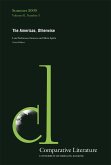This final installment of the Millennial Quartet addresses the question of whether cosmopolitanism -- ways of thinking, feeling, and acting beyond one's particular society -- is simply the universalism of a Western particular. Assembling scholars from an array of disciplines including English literature and language, romance languages, art history, South Asian studies, and anthropology, this special issue of Public Culture recenters the theory and history of translocal political aspirations and cultural ideas from the traditional Western vantage point to areas outside Europe, such as South Asia, China, and Africa. By examining new archives, framing new theoretical formulations, and suggesting new possibilities of political practice, these essays stretch the term cosmopolitanism to new definitions. On the one hand, cosmopolitanism may be taken to promise a form of supraregional political solidarity, but on the other, it may erode precisely those cultural differences that derive their meaning from a particular place and tradition. Given that most cosmopolitan political formations, from the Roman imperium to European imperialism to contemporary globalization, have been coercive and unequal, can there be a noncoercive and egalitarian cosmopolitan politics? At the most elevated level of conceptualization, while cosmopolitanism may promise a universalism of knowledge, it more typically represents an unwarranted generalization of a European idea or practice.
Hinweis: Dieser Artikel kann nur an eine deutsche Lieferadresse ausgeliefert werden.
Hinweis: Dieser Artikel kann nur an eine deutsche Lieferadresse ausgeliefert werden.








